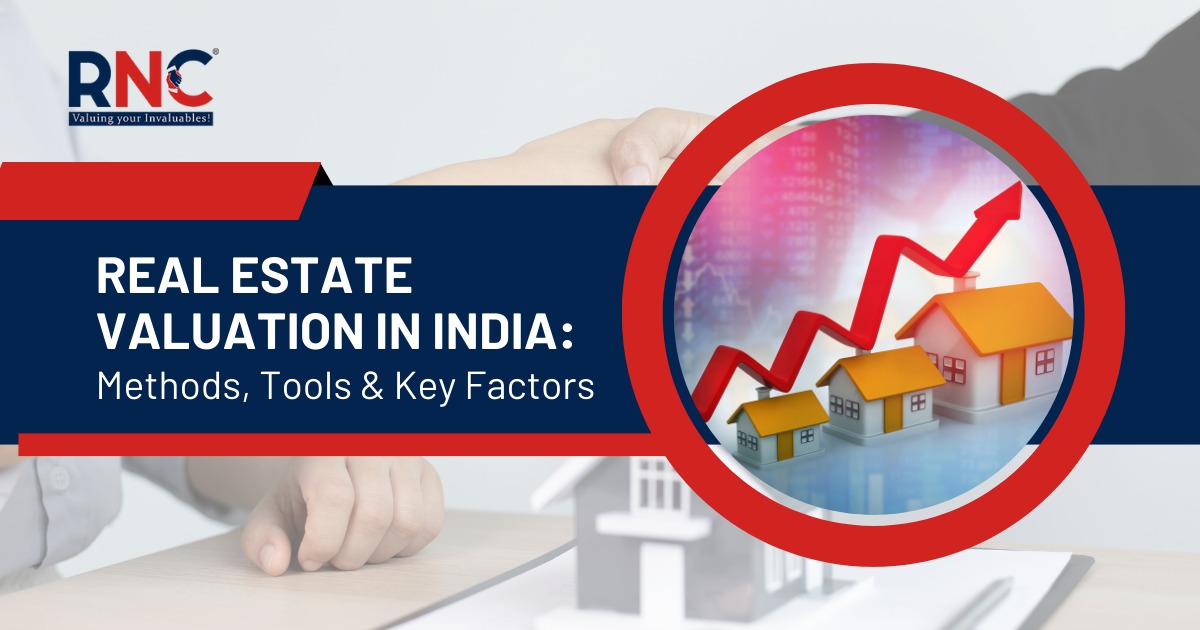
In today’s dynamic Indian property market, real estate valuation plays a crucial role in ensuring fair pricing, legal compliance, and smarter investment decisions.
Whether it’s buying a home, selling land, or raising funds for a commercial project, an accurate property valuation helps individuals and businesses protect their financial interests.
Beyond just numbers, valuation offers insights into a property’s true worth by considering location, market trends, infrastructure, and regulatory factors unique to India.
For investors and lenders, a reliable valuation safeguards against overpricing or under-valuation, ensuring informed decision-making and compliance with financial norms.
In Simple Terms: Real estate valuation means estimating the fair market worth of land, buildings, or property based on cost, income, and market factors.
Key Takeaways:
-
Real estate valuation determines fair property value based on location, demand, and market trends.
-
Three main methods: Cost, Income, and Market approaches.
-
Essential for investors, banks, and insurance assessments.
What is Real Estate Valuation?
Real estate valuation is the process of determining the fair market worth of a property, based on objective methods and current market conditions. It helps property owners and investors gain an accurate and transparent view of the asset’s actual market value.
Unlike a simple estimate, valuation is carried out by certified valuers who apply structured approaches such as the cost method, income method, or market comparison method. This makes the process credible and acceptable to regulators, banks, and investors.
In India, property valuation is essential not only for real estate transactions but also for taxation, loan approvals, insurance, mergers, and even legal disputes. A correctly assessed valuation protects stakeholders from financial risk and helps in regulatory compliance.
For example, when applying for a mortgage, lenders rely on professional land valuation and property assessments to ensure the loan amount is justified. Similarly, businesses use valuations to determine book value and make strategic decisions on assets.
At RNC Experts , decades of valuation expertise combined with compliance-driven processes allow clients to get precise and reliable results, whether for residential, commercial, or industrial
Learn more : what factors should you consider while doing property valuation
Why Real Estate Valuation is Important in India
In India’s fast-evolving property market, an accurate real estate valuation is more than a financial exercise — it’s a necessity for legal compliance, smart investments, and secure decision-making.
Professional property valuation ensures that all stakeholders, from homeowners to banks and corporate investors, operate with clarity and confidence.
Here are the key reasons why valuation plays such a vital role in India:
- Legal & Regulatory Compliance
- Valuation reports are mandatory for stamp duty, taxation, and compliance with RERA and other state-specific real estate laws.
- Courts and regulators often require certified valuations in cases of disputes or insolvency.
- Financial Decision-Making
- Banks and NBFCs rely on precise land valuation before approving loans and mortgages.
- Accurate valuation safeguards lenders against inflated property values and ensures fair lending practices.
- Investment & ROI
- For investors, valuation acts as a roadmap to predict future returns and avoid overpriced acquisitions.
- Developers use valuations to assess project feasibility and funding requirements.
- Insurance & Risk Management
- Insurers depend on professional valuations to determine adequate coverage and prevent claim disputes.
- Under- or over-insuring a property can be financially risky, making valuation critical.
- Corporate Strategy & M&A
- Businesses rely on real estate valuations during mergers, acquisitions, and restructuring to establish true asset worth.
- Listed companies often need valuations for accurate financial reporting.
Visit : distressed ma advisory
By combining regulatory knowledge with market insights, experienced firms like RNC help clients ensure accuracy, compliance, and financial protection through trusted real estate valuation services.
Methods of Real Estate Valuation Explained
Valuation isn’t a “one-size-fits-all” process. Different properties, purposes, and regulations require different approaches. In India, certified valuers use globally accepted and locally relevant methods to determine the true worth of property.
Here are the primary methods explained:
Sales Comparison Approach (Market Method)
This is the most widely used method, especially for residential properties.
- In this approach, a property’s worth is determined by analyzing recent transactions of comparable assets in the same area with similar attributes.
- When it’s used:
- Residential flats, plots, and ready-to-occupy homes.
- Areas where there is sufficient sales data.
Income Capitalization Approach
Ideal for commercial real estate and rental properties.
- How it works: The property value is based on the income it generates, capitalized at a market-derived rate of return.
- When it’s used:
- Office buildings, retail spaces, and rental apartments.
- Investment properties where ROI is the key driver.
Cost Approach
This approach works on the idea that a buyer will not pay more for a property than the cost of acquiring a similar alternative.
- How it works: The value of the property is equal to the cost of constructing a similar property, minus depreciation, plus the land value.
- When it’s used:
- New constructions and specialized buildings.
- When comparable sales are not available.
Development Method (Residual Approach)
Mostly applied to large development projects.
- How it works: The value is determined by calculating the potential selling price of a project minus construction, financing, and other development costs.
- When it’s used:
- Townships, malls, or mixed-use real estate projects.
Other Methods in Practice
- Guideline Value (Circle Rate Method) → Government-set rates for taxation and registration purposes.
- Discounted Cash Flow (DCF) → Used in complex cases to value future income streams.
- Combination Methods → Sometimes valuers combine multiple approaches for better accuracy.
Key Takeaway
Each method has its strengths and is applied depending on property type, purpose, and availability of data. Experienced valuers like RNC ensure that the chosen method complies with Indian regulations, international standards, and client objectives.
Modern Tools & Technology in Real Estate Valuation
The real estate sector in India is rapidly evolving, and so is the way properties are valued. Traditional methods remain essential, but technology-driven valuation tools are transforming accuracy, speed, and transparency.
Automated Valuation Models (AVMs)
- What it is: AVMs use mathematical modeling, market data, and comparable sales to instantly generate property values.
- Why it matters: Provides quick estimates, especially for banks and NBFCs during loan approvals.
PropTech & AI-Powered Platforms
- What it is: PropTech startups now use AI, machine learning, and big data to assess property values.
- Applications:
- Predicting price trends in micro-markets.
- Assessing rental yields and return on investment.
Online Property Valuation Tools
- What they offer: Many real estate portals allow free property valuation calculators.
- Pros: User-friendly, immediate results.
- Cons: Limited accuracy because they don’t consider legal, physical, or depreciation factors.
GIS & Data-Driven Analysis
- How it works: Geographic Information Systems (GIS) integrate property data with mapping tools.
- Use case: Evaluating infrastructure influence, connectivity, and locational advantages on property value.
Hybrid Approach – Tech + Expertise
- The most reliable valuations combine modern technology with professional expertise.
- At RNC, tools like AVMs and GIS are supplemented by certified valuers who factor in legal compliance, physical inspections, and market trends.
This hybrid model ensures both speed and regulatory acceptance.
Key Factors Affecting Real Estate Valuation in India
The value of a property in India isn’t decided by one element alone. Certified valuers assess multiple market, physical, and regulatory factors to determine its fair worth.
Main Factors to Consider:
- Location & Connectivity → Proximity to schools, business hubs, highways, and metros often increases property value.
- Market Demand & Trends → High demand in urban centers raises prices, while oversupply may reduce them.
- Property Age & Condition → Newer buildings or well-maintained properties typically command higher valuations.
- Legal & Regulatory Compliance → Clear titles, RERA approval, and adherence to zoning laws build trust and value.
- Government Guideline Values → Circle rates set by state authorities directly influence valuation benchmarks.
How to Hire Certified Real Estate Valuation Experts
Choosing the right valuer is critical — not only for accurate pricing but also for regulatory acceptance. In India, valuations are recognized only when carried out by certified professionals registered under RERA, IBBI, or international standards like IVS.
✅ Why Certified Valuers Matter
- Regulatory Compliance → Banks, courts, and government agencies accept only certified reports.
- Accuracy & Transparency → Certified valuers follow proven methodologies to avoid under or overvaluation.
- Trust & Credibility → Their assessments stand strong in audits, disputes, and legal proceedings.
📋 Checklist Before Hiring a Real Estate Valuer
- Verify registration with IBBI/RERA or recognized professional bodies.
- Check experience with residential, commercial, and industrial properties.
- Review case studies or client references for reliability.
- Ensure reports align with International Valuation Standards (IVS).
- Confirm the firm has both local market expertise and national compliance knowledge.
Looking to work with trusted experts?
Hire professional valuers at RNC for residential & commercial properties.
Book a Consultation
Conclusion
In India’s dynamic property market, real estate valuation is more than just a financial formality — it’s the foundation of smart investments, regulatory compliance, and secure lending decisions.
From traditional methods like the sales comparison approach to modern AI-driven valuation tools, accurate assessments help homeowners, investors, and businesses make informed choices.
By considering key factors such as location, market demand, property condition, and legal compliance, professional valuers ensure fair and transparent outcomes.
Most importantly, certified valuation experts bridge the gap between technology and trust, delivering reports that stand up to audits, courts, and financial scrutiny.
👉 Ready to safeguard your investments with accuracy and compliance? Hire expert valuers at RNC for residential, commercial, and industrial properties. Book a Consultation Today.
FAQs
1. What is real estate valuation in simple terms?
Real estate valuation determines the fair market worth of land or property based on cost, income potential, and comparable sales.
2. Which methods are used for real estate valuation in India?
The three main methods are Cost Approach, Income Approach, and Market Approach.
3. What factors affect property valuation the most?
Location, infrastructure, demand-supply, property condition, and legal status are key determinants.
4. Who performs real estate valuations in India?
Certified valuers registered under IBBI or professional firms like RNC Valuecon LLP.

About the author:
Sahil Narula
Sahil Narula is the Managing Partner at RNC Valuecon LLP and a Registered Valuer with IBBI. He brings over a decade of experience in Valuation Services, Corporate Finance, and Advisory, having led numerous complex assignments under the Insolvency & Bankruptcy Code, 2016, Mergers & Acquisitions, Insurance, and Financial Reporting.
He is a regular speaker at national forums (ASSOCHAM, CII, ICAI, IBBI, Legal Era) and currently serves as Co-Chairman of ASSOCHAM’s National Council on Insolvency & Valuations and a member of CII’s Task Force on Insolvency & Bankruptcy.
🤝Connect with Sahil on LinkedIn.
